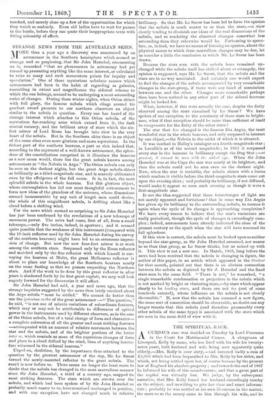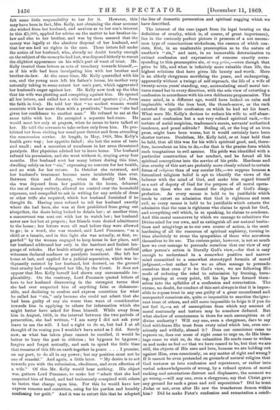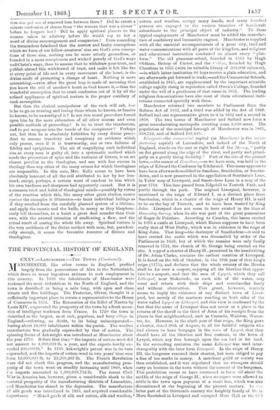THE SPIRITUAL RACK.
ACURIOUS case was decided. on Tuesday by Lord Penzance in the Court for Matrimonial Causes. A clergyman of Liverpool, Kelly by name, who has lived with his wife for twenty- seven years, both husband and wife being now apparently quite elderly,—Mrs. Kelly is over sixty,—had invested badly a sum of /5,000 which had been bequeathed to Mrs. Kelly by her sister, and which, not being settled upon her, of course became by the present law of England his absolute property ; and towards the end of 1867 he informed his wife of this misadventure, and that a great part of the capital was virtually lost. 1Ve judge, by the subsequent narrative, that Mrs. Kelly found her husband exceedingly touchy on the subject, and unwilling to give her clear and exact informa- tion'; probably he was nettled at his own ill-success in the matter, the more so as the money came to him through his wife, and he
felt some little responsibility to her for it. However, this
may have been in fact, Mrs. Kelly, not obtaining the clear account she wished from her husband, and anxious as to her son's interest in this £5,000, applied for advice on the matter to her brother-in- law and also to her brother, and was by them assured that the money was legally at the absolute disposal of her husband, and that her son had no rights in the case. These letters fell under the notice of her husband, who, already no doubt touchy enough on the subject of the money he had lost, was disposed bitterly to resent the slightest appearance on his wife's part of want of trust. Mr. Kelly treated these letters as acts of treachery towards himself,— as if his wife had been inculpating him with her brother and brother-in-law. At the same time, Mr. Kelly quarrelled with his son, and the young man left his father's house, his mother very naturally taking to some extent her son's part, which aggravated her husband's anger against her. Mr. Kelly now took up the idea that his wife was plotting and conspiring against him. He opened all her letters, and called her a vile traitor and apostate (i.e., from the faith in him). He told her that "no modest woman would associate with her more than with a prostitute," because "she had given her confidence to another man." He refused to eat at the same table with her. He occupied a separate bed-room. He would meet her only at prayers, when he seems to have talked at her. He told the servants to take orders only from him. He pro- hibited her from visiting her usual poor district and from attending the communion service. At length, in May, 1868, Mrs. Kelly's health gave way ; her appetite failed ; she lost the sense of taste and smell ; and a sensation of numbness in her arms threatened paralysis. Her physician advised her to leave home. The husband refused his permission, and she went without it, staying away four months. Her husband sent her many letters during this time, dwelling solely on her "sin," expressing no concern for her health, and no wish for her return. In October she returned, and her husband's treatment became more intolerable than ever. Between then and January, when she finally left him, she was deposed from her position in the house, debarred the use of money entirely, allowed no control over the household expenses, and compelled to ask in writing for any article of dress or other trifle she required, which her husband furnished if he thought fit. Having once refused to tell her husband exactly where she had been, she was at first prohibited from going out altogether, the doors being locked to detain her ; at another time, a manservant was sent out with her to watch her ; her husband never saw her but at prayers ; her friends were denied admittance to the house ; her letters were all read before they were allowed to go ; in a word, she was treated, said Lord Penzance, "as a child or a lunatic, and in this light she was actually, at first, re- garded" by the woman engaged to keep house in her place, and her husband addressed her only in the harshest and foulest lan- guage of rebuke. Her health utterly gave way, and the medical witnesses declared madness or paralysis imminent. She left her home at last, and applied for a judicial separation, which was in- dignantly resisted by her husband, but decreed, on the ground that cruelty had endangered her life, by the Court. It does not appear that Mrs. Kelly herself had shown any unreasonable im- placability. On the contrary, Lord Penzance quoted letters of hers to her husband disavowing in the strongest terms that she had ever suspected him of anything false or dishonour- able, and declining to confess and express contrition for what he called her "sin," only because she could not admit that she had been guilty of any sin worse than want of consideration towards him in applying to others for information which she might better have asked for from himself. While away from him in August, 1868, in the interval between the two periods of persecution, she had written, "I am sorry I did not ask your leave to see the will. I had a right to do so, but had I at all thought of its vexing you I wouldn't have acted as I did. Surely now, as what has taken place cannot be recalled, it would be better to bury the past in oblivion ; let bygones be bygones ; forgive and forget mutually, and seek to spend the little time that remains of this life on earth together in peace. . . . I promise, on my part, to do all in my power; but my position must not be one of scandal." And again, a little later. "My desire is to act towards you with the submission, obedience, and even affection of a wife." Of this Mr. Kelly would hear nothing. His object was, gathers Lord Penzance, to make her "admit that she had suspected him of fraud, and had traitorously conspired with others to fasten that charge upon him. For this he would have her express remorse and contrition, suing for his pardon and humbly confessing her guilt." And it was to extort this that he adopted
the line of domestic persecution and spiritual nagging which we have described.
The interest of the case (apart from its legal bearing on the definition of cruelty, which is, of course, of great importance), lies in the curiously perfect picture it presents of a not uncom- mon type of conscientious wickedness, the essence of which con- sists, first, in an unalterable presumption as to the nature of another's "sin," and next, in an immovable determination to. extract confession and expressions of remorse exactly corre- sponding to this presumptive sin, at any price,—even though that price be life, and what is infinitely more valuable than life, the highest relations that have given life beauty and worth. Here is an elderly clergyman sacrificing the peace, and endangering, apparently without a twinge of self-reproach, the life of a wife of twenty-seven years' standing, nay, accumulating small moral tor- tures round her in every direction, with the sole view of extorting a. confession in accordance with his own deliberate prepossession. The same mind, in a different age, would have looked on calm and implacable while the iron boot, the thumb-screw, or the rack extorted the specific confession on which he had set his heart. What were Mr. Kelly's devices to reduce his wife to self-abase- meut and confession but a not very refined spiritual rack,—the torture of social suspicion, tradesmen's sneers, servants' authorized insolence, and penal solitude? Boiling oil, or the hug of an iron press, might have been worse, but it would certainly have been shorter torture. Doubtless, Mr. Kelly held, or at least held that he held, that all this was for his wife's spiritual good, and, there- fore, incumbent on him to do,—for that is the precise form which such temptations to evil assume. His pride was identified with a. particular construction of her conduct, and he forced all his spiritual conceptions into the service of his pride. Hardness and iron cruelty of this sort are probably more closely related to certain forms of religious than of any secular life,—we suppose because a formalized religious belief is apt to identify the views of the believer with the mind of God, and make him regard himself as a sort of deputy of God for the purpose of all moral opera- tions on those who are deemed the objects of God's disap- probation. As every means is held to be justifiable which tends to extort an admission that God is righteous and man. evil, so every means is held to be justifiable which extorts the admission that the man is righteous who claims to speak for God, and everything evil which, in so speaking, he claims to condemn. And this moral manoeuvre by which we manage to substitute the Divine mind for our own, and so extinguish all our natural hesita- tions and misgivings as to our own course of action, is the most hardening of all the resources of spiritual sophistry, turning in, time absolutely to stone the sympathies of those who accustom. themselves to its use. The curious point, however, is not so much. how we ever manage to persuade ourselves that our view of any- other person's action is literally God's view,—for that is easy- enough to understand in a somewhat positive and narrow- mind committed to a somewhat stereotyped formula of moral judgment,—but rather how we so often manage to persuade- ourselves that even if it be God's view, we are following His- mode of reducing the rebel to submission by freezing, burn- ing, piercing at every point, till his lips have formed them- selves into the syllables of a confession and retractation. The- excuse, no doubt, for conduct of this sort always is that it is impos- sible to repose trust in any one guilty of a great unconfessed and unrepented conscious sin, quite as impossible to sanction the igno- rant trust of others, and still more impossible to feign it if you do. not feel it,—a set of assumptions from which any amount of moral contumely and torture may be somehow deduced. But what shadow of countenance is there for such assumptions as of divine authority? Will any one, even a clergyman, dare to say God withdraws His trust from every mind which has, even con- sciously and wilfully, abused it? Does our conscience cease to. reprove us, does our sense of right cease to urge us, do His bless- ings cease to visit us, do the calamities He sends cease to widen us and make us feel not that we have ceased to be, but that we are still, the objects of His care and love, because we are holding out against Him, even consciously, on any matter of right and wrong? If it cannot be even pretended on grounds of natural religion that God tortures us into confession and repentance, or rather into. verbal acknowledgments of wrong, by a refined system of moral. racking and ostentatious distrust and displeasure, the moment we- go wrong,—will any one, even a clergyman, say that Christ gave any ground for such a gross and evil superstition? Did he trust Judas or not, even after He saw the treacherous demon within him? Did he make Peter's confession and retractation a condi-
tion sine qua non of renewed love between them ? Did he extort a minute confessian of shame from "the woman that was a sinner" before he forgave her ? Did he apply spiritual pincers to the woman taken in adultery before He would say to her a word of divine encouragement and compassion ? Even conceding the tremendous falsehood that the narrow and faulty conceptions which we form of our fellow-creatures' sins are God's own concep- tions of those sins, nothing can be more utterly groundless, or founded in a more conspicuous and wicked parody of God's ways and Christ's ways, than to assume that to withdraw your trust, and publish abroad this withdrawal of trust, and make it felt like fire at every point of life and in every movement of the heart, is the divine mode of promoting a change of heart. Nothing is more astonishing,—even after the great leap is made of assuming that you know the evil of another's heart as God knows it, —than the wonderful assumption that to crush confession out of it by all the refined appliances of spiritual torture is the proper corollary of such assumption.
But then the clerical manipulator of the rack will ask, how is he to go on trusting and loving those whom he knows, or fancies he knows, to be unworthy of it? Is not this moral procedure forced upon him by the mere exhaustion of all other sincere and even possible methods of proceeding? Is he to trust the treacherous, and to put weapons into the hands of the conspirator ? Perhaps not, but then he is absolutely forbidden by every divine prece- dent to assume treachery and conspiracy on evidence which, only proves, even if it is trustworthy, one or two failures of fidelity and uprightness. The art of magnifying such individual sins as every man is guilty of, into a systematic method which needs the precaution of spies and the restraint of fetters, is an art almost peculiar to the theologian, and one with less excuse in theology than any other of the many crimes for which theologians are responsible. In this case, Mrs. Kelly seems to have been absolutely innocent of all the evil attributed to her by her hus- band, except, perhaps, a certain want of candour to him which his own hardness and sharpness had apparently caused. But it is a common trick and habit of theological minds—possibly by virtue of the reaction which this, like many other great studies, causes against the examples it illustrates—to treat individual failings as if they resulted from the carefully planned system of a lifetime, and apply the caustic and the knife, in mercy as they blasphem- ously tell themselves, to a heart a great deal sounder than their own, with the avowed intention of eradicating a flaw, and the actual result of searing the whole life away. Spiritual torture is the very antithesis of the divine method with man, but, paradoxi- cally enough, it seems the favourite resource of divines and theologians.








































 Previous page
Previous page